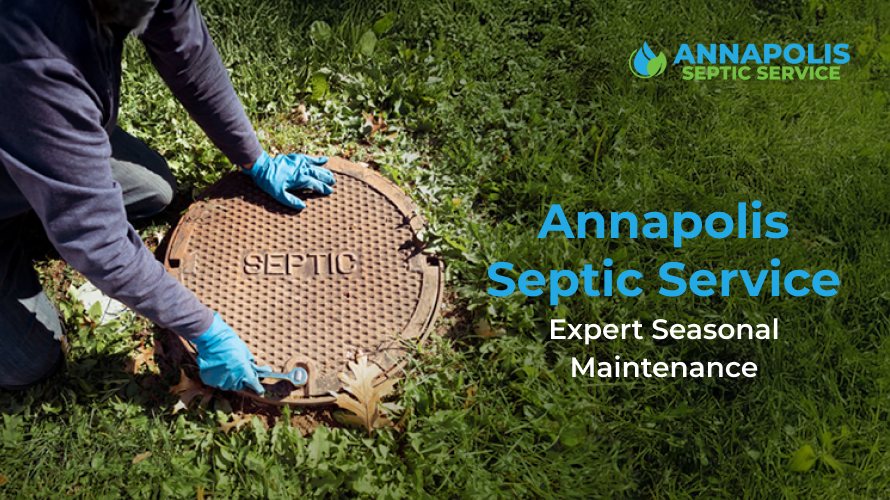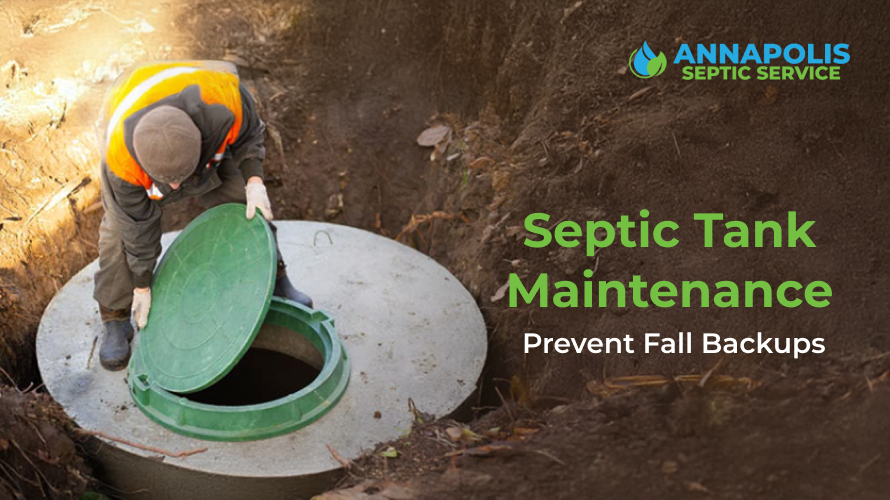It’s easy to forget about what’s happening underground until things go wrong. But if you’re a homeowner with a septic system, the last thing you want is a messy surprise when the leaves start falling. That’s why septic tank maintenance before autumn arrives isn’t just a “good idea,” it’s essential.
Let’s be honest. No one wakes up thinking about their septic tank. But giving it a little attention now can save you from headaches (and nose-pinching disasters) later. So, grab
your coffee and let’s chat about why a bit of late-summer TLC for your septic system can keep things flowing smoothly through the cooler months.
Why Fall Is a Critical Time for Septic Tank Maintenance
Fall brings more than pumpkin spice and sweater weather – it often brings heavier rains and falling temperatures, which can affect how your septic system works. Once the ground hardens from the cold, accessing your tank becomes more difficult and expensive. Also, if your tank is already on the verge of backing up, fall weather can exacerbate the issue.
That’s why late summer is the perfect window to check on your system. You want to make sure everything is working properly before unpredictable weather sets in. A little proactive septic tank maintenance now can prevent emergency repairs later.
Signs Your Septic System Needs Attention
Wondering if it’s time for residential septic tank cleaning or other maintenance? Here are some telltale signs your system is asking for help:
- Slow Flushing Toilets
If your toilet isn’t flushing as it should, it might not be a simple clog. Your septic tank could be nearing capacity.
- Gurgling Sounds
Hearing weird noises from your sinks or toilets? That’s a red flag.
- Water Pooling in the Yard
Random puddles of water (especially above the drain field) usually mean the tank is full or something is wrong underground.
- Foul Odors
This one’s hard to ignore. If it smells like a septic tank in your backyard or worse, inside, it’s time for immediate action.
Even if you’re not experiencing these symptoms, regular septic tank maintenance is still key. Many issues start silently, and by the time you notice them, the damage is done.
How Regular Septic Tank Maintenance Extends System Life
Think of your septic system like your car. You wouldn’t drive 100,000 miles without an oil change, right? Your septic tank requires the same level of regular care to continue functioning properly for years. Here’s how scheduled maintenance helps:
1. Prevents Costly Repairs
Catching small issues during a routine service is way cheaper (and less stressful) than dealing with a total system failure.
2. Keeps Wastewater Flowing Smoothly
When solids build up in your tank, they can block pipes and cause backups. Regular residential septic tank cleaning ensures everything flows where it’s supposed to.
3. Protects Your Drain Field
A healthy septic tank protects your drain field from becoming saturated or clogged, which is crucial for the system’s overall lifespan.
4. Maintains Home Value
Believe it or not, a well-maintained septic system can positively impact your property value. Buyers (and home inspectors) love seeing maintenance records.
Simple Maintenance Tips Homeowners Can Follow
While some septic services should be left to the professionals, there are things you can do to keep your system in top shape between cleanings:
- Be Mindful of Water Usage
Avoid overloading the system with too much water at once. Space out laundry loads and fix leaky faucets.
- Watch What You Flush
Only human waste and toilet paper should go down the toilet. No wipes, no grease, and definitely no “flushable” anything.
- Protect Your Drain Field
Don’t park cars, build structures, or plant deep-rooted trees over your drain field.
- Schedule Regular Inspections
Even if everything seems fine, a professional inspection every few years will catch issues early.
These simple habits, combined with routine septic tank maintenance, will keep your system running smoothly for years.
Why Late Summer Is the Best Time for Residential Septic Tank Cleaning
Summer is winding down, but it’s not too late to get ahead of potential septic troubles. Scheduling residential septic tank cleaning before fall means you’re clearing out any buildup from increased summer water usage (hello, extra laundry and backyard BBQs) and preparing for the wetter months ahead.
Cleaning the tank now ensures your system isn’t struggling to keep up as the seasons change. Additionally, technicians have easier access to your tank before the ground freezes or becomes muddy, which results in a cleaner, more efficient job.
Common Myths About Septic Tank Maintenance (Debunked)
Let’s bust a few myths that often mislead homeowners:
- If it’s not overflowing, it’s fine.
Not true. Septic systems can silently develop issues long before you see (or smell) them.
- Additives will solve my septic problems.
Some products claim to “eliminate pumping,” but nothing replaces professional cleaning. In fact, additives can disrupt the natural bacterial balance in your tank.
- I only need to pump every 10 years.
Most households need residential septic tank cleaning every 3 to 5 years, depending on usage. Waiting too long is asking for trouble.
Don’t Let Fall Catch You Off Guard

Taking care of your septic system now can save you a world of headaches when the weather turns cold and wet. A proactive approach to septic tank maintenance means fewer emergencies, less damage, and a healthier system that lasts for decades.
Annapolis Septic Service is committed to helping homeowners extend the life of their septic systems with thorough, professional maintenance. Our experienced team understands the importance of timing and precision in your septic care. If you’re looking to ensure your system is ready for the upcoming seasons, contact us to learn more about how we can help keep your home safe, clean, and problem-free.
FAQs
Why is late summer the best time for septic tank maintenance?
Late summer is an ideal time for septic tank maintenance because it allows homeowners to address potential issues before fall’s unpredictable weather sets in. As temperatures drop and the ground begins to harden, accessing your septic tank becomes more difficult and expensive. Additionally, fall often brings heavier rains, which can worsen existing septic problems like backups or saturated drain fields. By scheduling maintenance in late summer, you ensure your system is clear of buildup from increased summer water usage and fully prepared to handle the demands of the cooler, wetter months.
What are the early warning signs that my septic system needs attention?
Several subtle signs indicate your septic system might need immediate maintenance:
- Slow-flushing toilets can suggest your tank is nearing capacity.
- Gurgling noises from sinks or toilets point to potential blockages in the system.
- Unexplained puddles in your yard, especially above the drain field, are a red flag.
- Persistent foul odors around your home or yard signal that your septic tank may be full or malfunctioning.
Even if you don’t notice these symptoms, regular inspections are critical because many septic issues develop quietly before becoming obvious (and expensive) problems.
How does regular septic tank maintenance extend the life of my system?
Consistent septic tank maintenance plays a vital role in extending your system’s lifespan by:
- Preventing costly repairs through early detection of small issues during routine inspections.
- Ensuring smooth wastewater flow by removing solids that can block pipes and cause backups.
- Protecting the drain field from clogs or saturation, which is essential for the system’s overall health.
- Maintaining property value, as a well-documented septic maintenance history is appealing to buyers and home inspectors.
Just like a vehicle needs regular oil changes, your septic system relies on proactive care to function efficiently for years.
What simple maintenance habits can homeowners follow to protect their septic system?
While professional septic services are essential, homeowners can adopt simple habits to keep their system running smoothly:
- Monitor water usage to avoid overwhelming the tank, especially by spacing out laundry loads and fixing leaks.
- Be cautious about what you flush – only human waste and toilet paper should go down the toilet. Avoid wipes, grease, and other non-biodegradable items.
- Protect the drain field by not parking vehicles, placing heavy structures, or planting deep-rooted trees over it.
- Schedule regular inspections every few years to catch problems before they escalate.
These daily practices, combined with routine professional maintenance, help prevent major septic issues and costly repairs.
Do septic tank additives eliminate the need for professional cleaning?
No, septic tank additives do not replace the need for professional septic tank cleaning. Some products claim to reduce or eliminate pumping, but in reality, they can disrupt the natural bacterial balance within the tank. Additives may even cause more harm by pushing solids into the drain field, leading to clogs or damage. Regular professional cleaning, every 3 to 5 years (depending on household usage), is the most reliable way to ensure your septic system remains functional and problem-free. Relying solely on additives can lead to unnoticed buildup, system failures, and costly emergency repairs.

